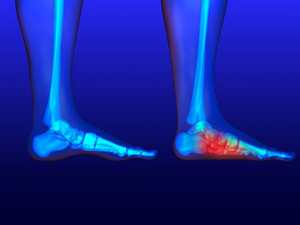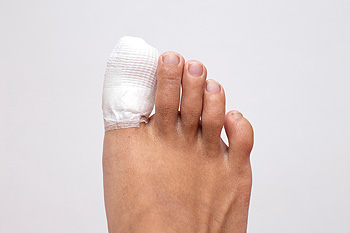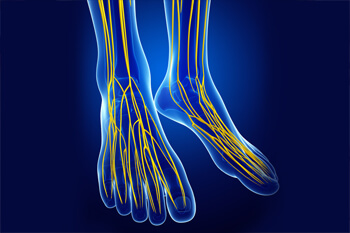 Heel pain can have a wide variety of causes, but the location of the pain can help to guide a proper diagnosis. Pain along the bottom of the foot can be caused by plantar fasciitis, heel pad syndrome, plantar warts, calcaneal stress fractures, nerve entrapment, or a neuroma. Pain in the middle of the foot can be due to peroneal tendinopathy, sinus tarsi syndrome, or tarsal tunnel syndrome. Pain in the back of the foot can be caused by Sever’s disease, Achilles tendinopathy, or a Haglund deformity. Seeing a podiatrist is the first step to healing your heel pain. A podiatrist will be able to examine your heel, ask questions about your current symptoms and medical history, and perform the tests necessary to diagnose and treat your heel pain.
Heel pain can have a wide variety of causes, but the location of the pain can help to guide a proper diagnosis. Pain along the bottom of the foot can be caused by plantar fasciitis, heel pad syndrome, plantar warts, calcaneal stress fractures, nerve entrapment, or a neuroma. Pain in the middle of the foot can be due to peroneal tendinopathy, sinus tarsi syndrome, or tarsal tunnel syndrome. Pain in the back of the foot can be caused by Sever’s disease, Achilles tendinopathy, or a Haglund deformity. Seeing a podiatrist is the first step to healing your heel pain. A podiatrist will be able to examine your heel, ask questions about your current symptoms and medical history, and perform the tests necessary to diagnose and treat your heel pain.
Many people suffer from bouts of heel pain. For more information, contact the podiatrists of Boston Common Podiatry. Our doctors can provide the care you need to keep you pain-free and on your feet.
Causes of Heel Pain
Heel pain is often associated with plantar fasciitis. The plantar fascia is a band of tissues that extends along the bottom of the foot. A rip or tear in this ligament can cause inflammation of the tissue.
Achilles tendonitis is another cause of heel pain. Inflammation of the Achilles tendon will cause pain from fractures and muscle tearing. Lack of flexibility is also another symptom.
Heel spurs are another cause of pain. When the tissues of the plantar fascia undergo a great deal of stress, it can lead to ligament separation from the heel bone, causing heel spurs.
Why Might Heel Pain Occur?
- Wearing ill-fitting shoes
- Wearing non-supportive shoes
- Weight change
- Excessive running
Treatments
Heel pain should be treated as soon as possible for immediate results. Keeping your feet in a stress-free environment will help. If you suffer from Achilles tendonitis or plantar fasciitis, applying ice will reduce the swelling. Stretching before an exercise like running will help the muscles. Using all these tips will help make heel pain a condition of the past.
If you have any questions please contact our office located in Boston, MA . We offer the newest diagnostic and treatment technologies for all your foot and ankle needs.


 Broken toes
Broken toes





